|
The question comes up a lot. Which is more
important for getting quality photographs, a talented photographer
or great gear? Of course, it seems obvious to anyone with even
modest intelligence that in photography as in any art or craft
there is no art without the artist and no craft without the craftsman.
But, it is also no less obvious that for any particular task
a certain minimum level of tool capability is required as well.
And, some tasks are more technically demanding than others, requiring
a more capable tool set -- a point that is often overlooked.
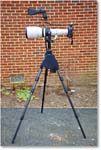
Wherever photographers gather to discuss
the merits of gear, someone is almost certain to answer the most
innocent of gear questions with a sanctimonious putdown: "it's
the photographer, not the gear." Or, "You ought to be out shooting
rather than asking about such-and-such gear." The implication of this
undeserved response is that if the original questioner was anything
other than a hopelessly inept thumb footed boob he would be out
taking award-winning pictures with his Kodak disposable rather
than asking irrelevant questions about unnecessary gear.
Perhaps it's muddled thinking, perhaps
it's a desire to hear the sound of their own voices or perhaps
it's a somewhat darker urge to inflict a verbal ambush attack
on some innocent passerby. But, whatever the reason, this blast
is a sure sign of imprecise thought. Really, the situation is
quite easily understood if one approaches it analytically --
but then in an era of mass public education designed more for
social purposes than to foster clear thought who can be surprised
that the point gets missed. In analyzing the relationship of
two such variables, there are four possible directions to take
-- and only four (expressed, we admit, somewhat tongue-in-cheek!)
-
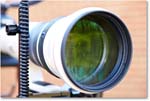
Neither photographer talent nor gear capability
matter. Great photographs are random events and no one understands
how or why they happen. Maybe it's cosmic rays colliding with
random neurons in the brain, or maybe it's the fluoride in the
water. . .
- Only gear matters. Anyone can make a great
photograph if they buy sufficiently expensive and complex gear.
Imagine an infinite hall of monkeys, each with an expensive,
high-quality typewriter. Supply plenty of bananas. Wait long
enough and all of Shakespeare's works will be reproduced. Likewise,
give those same monkeys a container ship full of Linhofs and
they will reproduce all the works of Ansel Adams -- if they can
find enough sheet film, that is. Talent is for dopes.
-
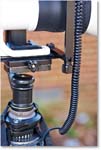
Only photographer talent matters. Gear
is for dopes. Any great photographer can take great pictures
of any possible subject with any old camera that falls to hand.
That's why St. Ansel hiked Yosemite for decades with a highly
portable pinhole camera made from a lightweight cardboard cereal
box. (It was certainly easy on the knees.) And, that's why the
sidelines of today's fast-paced sporting events are populated
with highly maneuverable cell phone cams rather than nasty old
lumbering big glass and heavy high frame rate bodies. No, wait.
. .
- Photographer talent is a prerequisite
-- as it is with any other creative undertaking. And, depending
on circumstances, there may be tools more suited for the task
at hand than other tools. Thus, sometimes gear confers advantages
that are worth having.
Stated with some degree of structured thought, there
really is no controversy here. Would that quieting the crazies was that easy!
Michael Reichmann Strikes Back
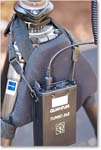
Some
time ago Michael Reichmann, a respected
landscape photographer and publisher of the popular web site,
Luminous-Landscape,
posted an article protesting this oft-repeated slap-in-the-face
to people wishing to learn more about the tools of their interest.
Mr. Reichmann's article, "Your Camera Does Matter," took a decidedly negative view of the usual
sanctimonious putdown. His essay immediately drew praise from
those frustrated by the recurrence of such rude, cliched slams
as well as condemnation from those determined to project on Mr.
Reichmann's piece opinions that cannot be found therein.
The misrepresentation chosen by some was
the claim that his article asserts that gear can somehow compensate
for a lack of photographic talent -- where talent here implies the artistic
variety. This would be a grievous indictment
indeed if true. But of course, nowhere does Mr. Reichmann say
anything remotely akin to this howler of a strawman. Nor is this
a view held by any serious photographer I know. Here is what
Mr. Reichmann actually wrote:
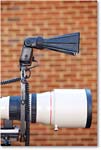
"Whether a home-made pin hole camera
or the latest Nikon D3, these are all cameras. Of course where
they differ is in their technology, and that difference translates
into both difference in convenience of use and ultimate image
quality."
and
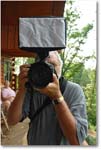
"Tools have merits, good ones and bad. Tools
have so-called personality as well. What suits one person's needs
may not meet the needs of another.
"And, herein lies the crux of the matter.
We all have different needs. A photographer walking the streets
of an urban environment doing street shooting has very different
needs than someone on the Serengeti photographing wildlife.
A photographer looking to create large prints of extremely high
quality landscape work will of necessity need a different set
of tools than a teenager wanting to record her sweet-sixteen
party."
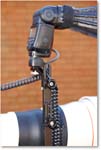
Nowhere is the claim made that equipment
substitutes for talent. The article never suggests that creativity,
photographic vision, composition, understanding of lighting,
or even determination in the field or studio to create something
memorable are irrelevant. Instead, gear is said to provide advantages
in "convenience of use and ultimate image quality."
The latter point must, by context, refer specifically to technical
quality, not creative or compositional quality (except, perhaps,
to the degree that technical limitations prevent the full expression
of the creative impulse).
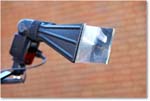
The message is that equipment acts as an
enabler for the expression of talent in the pursuit of some photographic
goal -- and some equipment may enable better than others, depending
on goals and circumstances. We add that those who
seek to provide themselves with gear well adapted to the task at hand should not be assailed because
they wish to avail themselves of this advantage.
Knocking the Stuffing out of the Strawman
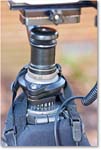
Opponents of the view that gear has an
influence on outcome like to paint a scenario where multiple
photographers of differing talents are presented with the same
equipment and circumstances. Then, they contend, the better photographers
will produce better images. In fact, they smugly intone, even
lesser equipped but talented photographers will do better than
well-equipped inepts. This latter case is the real strawman, set up to be
knocked down. How so? Because, nobody claimed otherwise.
That wasn't the original argument. Instead, the original statement
was that a difference in gear technology "translates into
both difference in convenience of use and ultimate image quality."
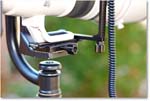
In logic, this technique is called the
fallacy of the strawman argument. A thesis entirely different
than that advanced by the original writer is substituted and
then refuted while the original issue is completely sidestepped.
Compounding the fallacy, the misstated (and thus irrelevant)
premise (that good photographers will do better than not-so-good
ones) is so obviously true (Duh!) as to not be denied by any
serious observer -- and is therefore hardly worthy of discussion.
To borrow from information theory, its actual information content
approaches zero. Therein lies its effectiveness despite being
fallacious -- if one fails to recognize and throw out the initial
irrelevant but oh-so-enticing premise it is difficult to cope
with the remainder.
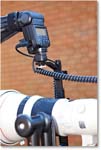
Here is a situation more in keeping with
the original thesis. Give gear with significantly different capabilities
to multiple photographers of comparable ability -- or to the
same photographer during similar photo sessions at different
times. Depending on the nature of the challenges presented by
the circumstances vs. available gear, the photographers with gear
more suited to the task at hand are more likely, on average,
to produce more suitable images. Of course, for
some circumstances differences in gear may make little difference in the
outcome and for others quite a lot. It
seems sad that such an obvious statement must be
made. This is not rocket science. Gear is an enabler, no more.
Horses for courses.
How About Constructive Responses Instead
of Putdowns?

What set Mr. Reichmann off, it appears,
is not the incontrovertible truism that, all other things being
equal, better photographers capture better images (both technically
and creatively) but rather the mind-numbingly repetitious restating
of the blindingly obvious as if it were newly revealed wisdom
from on high, writ in flaming letters on tablets of stone and
brought down from the mountain like a prophesy of ancient times.
Many who post such responses to gear questions (on gear forums,
no less!) come across as smugly superior know-it-alls fairly
dripping with the expectation of winning a Pulitzer Prize for
rhetorical erudition -- an expectation that will undoubtedly
remain unrequited. Mr. Reichmann again:
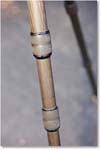
"Come on folks. Don't they teach analytical
thinking in schools any more? Enough cliched rejoinders that serve no ones
interests other than to inflate the egos of some, and confuse and
embarrass others. When a person asks these type of questions let's be
generous instead of snarky. Let's ask them the type of photography they are doing, or plan on doing, and
then if we have anything worthwhile to contribute, do so. But
to spout holier-than-thou cliches one more time is simply the
sign of either a lazy or an angry mind."
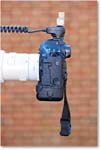
It seems to me that the whole "it's
the photographer, not the gear" mantra is profoundly insulting. Whether
intended or not, the between-the-lines message comes across thusly,
"Unlike the savant that I am, you're a worthless, inept
fool, and no amount of high-priced gear is going to make you
a good photographer so shut up about the gear." While this
may even be true, it is an inappropriate comment in a civil conversation
-- and might be admissible even if rude only if the original
correspondent falsely claimed to be a good photographer. Otherwise,
it is downright rude. Not to mention that fact that it fails
to answer the question originally posted -- which, after all,
dealt with gear. Which is also rude.
Referral to Authority -- i.e. Real Professional
Photographers
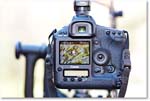
One always likes to know what respected
practitioners think. In an article of several years ago that
I can no longer find on their HootHollow.com web site, Joe and
Mary Ann McDonald explained why they switched from Nikon to Canon.
(Cited here for illustration only; not to re-ignite that debate!)
Repeating from memory (inexactly, no doubt), they said that the
switch did not make them better photographers (in the artistic sense,
undoubtedly) but it did help
them capture more and better images of the type they wished to
capture. George Lepp has long used the tag line, "optimize
the possibilities" -- a statement not directed specifically
at gear but that certainly encompasses the advantages that suitable
gear can provide in fulfilling one's creative vision.
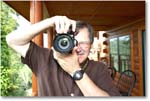 To
me, these statements by respected
pros make the case very well. For a given level of talent, gear is
one factor in optimizing the chances of getting the images one
sets out to capture. Finally, and for the record, no one is denying
the benefits of working hard and educating oneself in order to
refine one's skills -- not so that one can "be anything
you want to be" -- which, for a given level of innate talent may
be unrealistic unless one's expectations are modestly placed
-- but rather to enable one to "be all that you can be."
To
me, these statements by respected
pros make the case very well. For a given level of talent, gear is
one factor in optimizing the chances of getting the images one
sets out to capture. Finally, and for the record, no one is denying
the benefits of working hard and educating oneself in order to
refine one's skills -- not so that one can "be anything
you want to be" -- which, for a given level of innate talent may
be unrealistic unless one's expectations are modestly placed
-- but rather to enable one to "be all that you can be."
|


